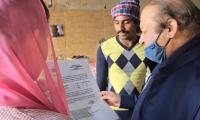The third phase of the Indian parliamentary elections ended early this week. I am so wilfully removed from the process that when I learnt that the government had declared a holiday for all schools and educational institutes of South Kashmir for Monday I thought it were Election Day. In the morning, when I called several people to know about the progress, I felt a little unsettled after I was told that I was off-the-mark by one full day.
The exercise was graced by a near-total general strike, or hartal in common parlance. The strike was called by the Joint Resistance Leadership that rose from the ashes of two competing iterations of the Hurriyat Conference, a forum of pro-freedom political outfits that was once feted as representing Kashmiri sentiments. So, we had the first two days of the week consigned to official holiday-cum-public-hartal. Since my son started to live with me in Kashmir almost two years ago, he has grown accustomed to the sudden and quite frequent unplanned breaks. What makes such occasions severely challenging is the accompanying internet blockade that has now become the chosen prescription to muffle popular sentiment.
Polling day was unusually quiet but for a few dozen who cast their votes. According to official data, my hometown Bijbehara polled less than two thousand out of a total of 93,289 voters. Among the 120 polling booths spread across the Anantnag district, 65 booths registered zero voting. Out of these, 40 were located in Bijbehara. Since this is the home constituency of Mehbooba Mufti, the BJP-supported former chief minister, this can be seen as a clear indication of mass public anger against her misrule that witnessed butchering of hundreds of youth, and thousands more with life-changing injuries, and many more thousands incarcerated and tortured. Even Mufti’s extended family, which massively benefitted in her regime felt so pressurised by the salient public sentiment that they chose to stay indoors. Due to security considerations, the governor’s administration that manages Jammu and Kashmir during the ongoing president’s rule curtailed voting time for the Anantnag Lok Sabha seat by a couple of hours.
While Bijbehara remained calm, but for some minor incidents of stone-pelting by small groups of protesters, there were some forceful and violent demonstrations in other places. A police constable who was ferrying a contingent of paramilitary Indo-Tibetan Border Police (ITBP) back from their poll duty died as his vehicle overturned after a group of protesters stoned them in Kokernag, a scenic place famous for its water streams said to contain magical cures. Several ITBP personnel were also injured, some of them seriously. The attack was so furious that the polling staff, usually formed out of government employees coerced to perform these duties, could not reach their homes despite official transport and security escort. Many of them had to take shelter in derelict government buildings with some without any food or water.
One of the government employees told me of his nightmarish experience surviving public anger and onslaught as they were forced to seek shelter in a government school building that doubled as the venue for a polling booth. When I met him he had just reported back to his actual duty station and looked flustered and distraught.
Following the voting, Bijbehara was abuzz with large sections of people suggesting the end of Mufti’s political career. Although there is further voting in two more phases for the Anantnag parliamentary seat, the contest is now being seen largely between the National Conference and Congress. Mufti is said to have realised the current, as she has been thoroughly humbled by the public affront. In the aftermath, according to some local sources, she has allegedly confided to a group of her die-hard cronies that she made a mistake by entering the contest. She had realised it whilst in power. In the seat that has been vacant for more than two years, she first tried to field her brother and then sought to delay the elections under the pretext of a bad security situation.
After her unceremonious ouster when her alliance partner BJP pulled the rug from under her feet, Mehbooba Mufti tried hard to reinvent her image as a pro-Kashmiri politician. She even started her trademark funereal visits to the houses of Kashmiri resistance fighters slain in gun battles with the Indian army. But this has not helped as people have openly called her bluff. Last week, during a low-key electoral campaigning visit in her home constituency she was attacked by people with stones and hateful slogans. This caused her such delirium as to publicly ask what she had done to deserve such treatment. She conveniently forgot her track record which, apart from wanton brutality and callous murders, also includes a blanket ban on Eid prayers, a first in Kashmir’s current political history.
Postscript: A day after the elections, around 2:30 in the morning, our locality woke up to loud bangs and intermittent shelling. Soon, the internet was blocked, a sure sign of some serious trouble. As the sun rose, we found out that two resistance fighters – one local and another from Anantnag town – were killed in a residential house in Bagander, a locality barely half a kilometre from my house. The youth, one of them a physiotherapist who had joined the ranks barely ten months ago, were buried alive under the tonnes of concrete rubble as the military forces destroyed the house in heavy shelling.
In protest against the killings, the town observed a hartal, the third one in a week. Friday was also dedicated to the memory of those slain. There is some feeble chance to see some normal life today – unless the military forces decide to score more killings!
Twitter: @murtaza_shibli
As usual, any such deal, aiming to resuscitate ailing economy, brings to fore urge and resolve to halt further...
A representational showing sticky notes on a board. — Unsplash/FileThere are some common themes from the lives...
Whether the Daanish Schools effort has been able to live up to its principles or not may be debatable
According to the federal government, last year 653,100 people experienced homelessness on a single night in America
Another advantage for Pakistan is the enhanced teledensity and internet penetration
Both media spheres need to dovetail in amplifying the urgency of addressing climate change at the local, national, and...







